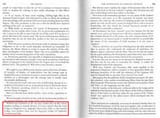Search Results
7/8/2025, 11:58:18 PM
>>509867835
>It seems clear that the Lodge of the Philadelphians was, by its very nature, one of those secret societies which outwardly imitated the masons but which were essentially conspiratorial political organizations. The Lodge itself did not openly engage in political activities, unless one regards the banquets it organized as such activities. For political occasions it created special organizations, which formally led an independent existence but in fact were under the complete control of the Lodge, which used them as political instruments.
>That the International Association, the Commune Revolutionnaire, and the Philadelphians were all organizations of the old conspiratorial type is evident from their pronounced sympathy for individual acts of political terror (...) It is important to stress that the Philadelphians, too, and apparently all societies connected with them organizationally, must be regarded as sympathizing with individual acts of political terror. The attitudes of these groups toward the terrorist activities organized by Mazzini and his supporters leads us to this conclusion.
>The part played by individual Philadelphians in [the founding of the First International in] 1864 was enormous; Victor Le Lubez, to name only the most important, personally undertook the tremendous work of organizing the meeting of September 28, 1864, at which the General Council of the First International was elected. (...) they never for a minute abandoned their conspiratorial traditions, and from the very beginning planned to use the new International, an alliance of workers' organizations, for the purpose of strengthening their own organization. Whenever possible, they tried to place their own people, who shared their views on tactics, in leading positions in the new International. The General Council of the International was selected by Le Lubez, and included a large and influential group of Philadelphians.
>It seems clear that the Lodge of the Philadelphians was, by its very nature, one of those secret societies which outwardly imitated the masons but which were essentially conspiratorial political organizations. The Lodge itself did not openly engage in political activities, unless one regards the banquets it organized as such activities. For political occasions it created special organizations, which formally led an independent existence but in fact were under the complete control of the Lodge, which used them as political instruments.
>That the International Association, the Commune Revolutionnaire, and the Philadelphians were all organizations of the old conspiratorial type is evident from their pronounced sympathy for individual acts of political terror (...) It is important to stress that the Philadelphians, too, and apparently all societies connected with them organizationally, must be regarded as sympathizing with individual acts of political terror. The attitudes of these groups toward the terrorist activities organized by Mazzini and his supporters leads us to this conclusion.
>The part played by individual Philadelphians in [the founding of the First International in] 1864 was enormous; Victor Le Lubez, to name only the most important, personally undertook the tremendous work of organizing the meeting of September 28, 1864, at which the General Council of the First International was elected. (...) they never for a minute abandoned their conspiratorial traditions, and from the very beginning planned to use the new International, an alliance of workers' organizations, for the purpose of strengthening their own organization. Whenever possible, they tried to place their own people, who shared their views on tactics, in leading positions in the new International. The General Council of the International was selected by Le Lubez, and included a large and influential group of Philadelphians.
Page 1
